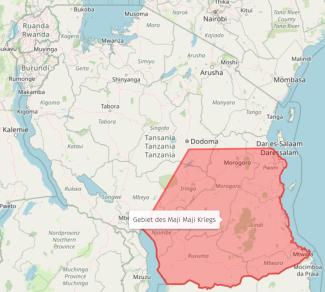Maji-Maji



Mnyaka Sururu Mboro, Vorstandsmitglied bei Berlin Postkolonial
„Es ist an der Zeit, dass sich Deutschland unmissverständlich zu seiner kolonialgeschichtlichen Verantwortung bekennt und den Worten dann auch Taten folgen lässt. Wir wollen nicht nur unsere entführten Ahnen und Kulturschätze zurück, wir wollen auch eine Entschädigung für das, was unwiederbringlich zerstört worden ist.“
German Literature below.

On the 100th anniversary of the beginning of the war, a number of commemorative events were held in Germany and Tanzania through the initiative of civil society, academia and religions. From the state side, there was vanishingly little initiative in both countries. Here are some examples of non-governmental commemorative events in Germany

Colonial revisionism, nostalgia and concealment are three characteristics of the way colonial heritage is dealt with in Germany. Although there has recently been a Maji-Maji-Allee (Berlin), colonialism otherwise plays a minor role in history lessons and in public reappraisal and commemoration.

Tanzanian scholars began researching the Maji Maji War and interviewing contemporary witnesses immediately after independence. The Maji Maji Research Project (1967 - 1969) laid the foundation for the study of the war and its consequences. Schools, hospitals and streets were renamed after anti-colonial resistance fighters and monuments were erected - such as the one for Kinjikitile Ngwale in Kilwa Kivinje.

Consequences of the war included famine, homelessness, increased infant mortality, and ecological consequences. The spread of bush and game resulted in a decrease in arable land and an increase in disease-carrying tse-tse flies. Political and social structures were permanently destroyed by the targeted murder of local leaders. As a result of the Maji-Maji War, colonial rule changed for the last few years. Weakened by the consequences of the war, there was no further successful and widespread resistance by the locals.

The newly introduced poll tax, which was about four times higher than the previous cottage tax, as well as the ban on hunting game and land expropriation, forced the colonized to work on the plantations. In the process, they experienced humiliation, beatings, and oppression. As a sign of protest, members of the Wamatumbi destroyed German cotton fields in July 1905. Houses and settlements were looted and set on fire, administrative personnel were chased away, and military posts were stormed.

From the 1880s, private expeditions such as those of the "Gesellschaft für deutsche Kolonisation" (with Carl Peters) began to "acquire" land in East Africa. After the resistance of the East African coastal population (often still titled "Arab Revolt" in Germany) in 1888, the German Empire intervened and sent military support in the form of the "Imperial Protection Force for East Africa / kaiserliche Schutztruppe für Ostafrika" which violently put down the resistance.
Tanzania was part of the colony "German East Africa" from 1885 to 1918. Violence, illegitimate land grabbing, civilizing mission, exploitative politics as well as interventions in established socio-cultural social systems have left their mark in Tanzania as in Germany: The colonial legacy today consists of infrastructures, economic-neocolonial dependencies, stereotypes and prejudices, global political power (in)equalities, heroic narratives, traumatic family stories, looted artworks or postcolonial knowledge structures.